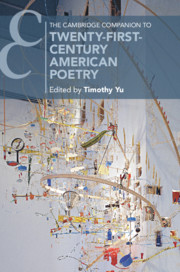Book contents
- The Cambridge Companion to Twenty-First-Century American Poetry
- The Cambridge Companion to Twenty-First-Century American Poetry
- Copyright page
- Contents
- Notes on Contributors
- Chronology
- Introduction
- 1 New Black Aesthetics: Post–Civil Rights African American Poetry
- 2 Traditions of Innovation in Asian American Poetry
- 3 Locations of Contemporary Latina/o Poetry
- 4 Sovereign Poetics and Possibilities in Indigenous Poetry
- 5 Changing Topographies, New Feminisms, and Women Poets
- 6 The Nearly Baroque in Contemporary Poetry
- 7 Disability Aesthetics and Poetic Practice
- 8 Queer Poetry and Bioethics
- 9 Trauma and the Avant-Garde
- 10 Blockade Chants and Cloud-Nets: Terminal Poetics of the Anthropocene
- 11 Give Me Poems and Give Me Death: On the End of Slam(?)
- 12 Anti-capitalist Poetry
- 13 Of Poetry and Permanent War in the Twenty-First-Century
- 14 Poetry in the Program Era
- 15 The Future of Poetry Studies
- Further Reading
- Index
- Cambridge Companions to …
- References
8 - Queer Poetry and Bioethics
Published online by Cambridge University Press: 25 February 2021
- The Cambridge Companion to Twenty-First-Century American Poetry
- The Cambridge Companion to Twenty-First-Century American Poetry
- Copyright page
- Contents
- Notes on Contributors
- Chronology
- Introduction
- 1 New Black Aesthetics: Post–Civil Rights African American Poetry
- 2 Traditions of Innovation in Asian American Poetry
- 3 Locations of Contemporary Latina/o Poetry
- 4 Sovereign Poetics and Possibilities in Indigenous Poetry
- 5 Changing Topographies, New Feminisms, and Women Poets
- 6 The Nearly Baroque in Contemporary Poetry
- 7 Disability Aesthetics and Poetic Practice
- 8 Queer Poetry and Bioethics
- 9 Trauma and the Avant-Garde
- 10 Blockade Chants and Cloud-Nets: Terminal Poetics of the Anthropocene
- 11 Give Me Poems and Give Me Death: On the End of Slam(?)
- 12 Anti-capitalist Poetry
- 13 Of Poetry and Permanent War in the Twenty-First-Century
- 14 Poetry in the Program Era
- 15 The Future of Poetry Studies
- Further Reading
- Index
- Cambridge Companions to …
- References
Summary
Twenty-first-century poets, particularly queer Indigenous and queer of color poets, have taken particular interest in lyric, its excesses, and its transformative potential. Queer Indigenous and queer of color poets make clear that the relationships that make and sustain life are not merely those between human selves. The poems discussed retain the physicality associated with the lyric voice but reject its fantasy of a self-organizing, independent consciousness. They explore what might happen when the speaker's crystalline singularity is shattered – first, by a more accurate conception of the interdependence of living beings; and second, by historical and contemporary conditions of mass death. Tommy Pico’s Nature Poem makes astute use of the conventions of lyric poetry and its associated reading practices in order to invoke, if not inaugurate something different – poetry that disidentifies with the form of the person and that radically expands the tripartite relation of speaker, addressee, and audience that structures the American lyric tradition.
- Type
- Chapter
- Information
- The Cambridge Companion to Twenty-First-Century American Poetry , pp. 120 - 131Publisher: Cambridge University PressPrint publication year: 2021
References
Works Cited
- 1
- Cited by



